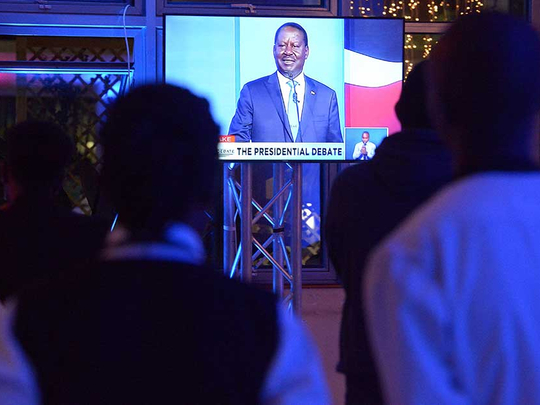
Nairobi: Kenyan President Uhuru Kenyatta was a no-show on Monday at a televised debate ahead of August 8 elections, leaving his main rival Raila Odinga alone to field questions.
Odinga, who is the flag-bearer for the National Super Alliance coalition, said his top priorities if elected in the August 8 general election would be to lower food prices and rent and tackle youth unemployment.
“First is the issue of putting food on the table, reducing the cost of living for the people. This is our priority number one. We address the issues of flour, so that we can lower the prices of maize flour, sugar,” he said.
He said to lower rent he would enforce the existing rent restrictions act. “This law is meant to protect the poor from exploitation by the landlords,” Odinga said.
Both candidates had initially pulled out of the final debate, but after a change in format Odinga agreed to take part and the moderators were left in suspense until the last minute over whether or not Kenyatta would show up.
The office of Kenyatta, who is running for a second and final five-year term in office, gave no explanation for his absence.
This gave veteran opposition politician Odinga 90 minutes to field questions about his policies, attack Kenyatta’s government and defend his record during his time as prime minister in a power-sharing government after disputed 2007 polls.
The solo debate comes as several pre-election polls show an extremely tight race between the historical rivals, and it was unclear if the lack of a proper presidential debate would sway voters.
Kenyatta “owed the country a duty to appear, a duty to account for his five years,” said Miguna Miguna, a former adviser to Odinga and independent candidate for Nairobi governor, as part of the post-debate analysis.
“I think it was a mistake of monumental proportions. It was a miscalculation, a deliberate or naive misunderstanding of what the president means.”
Other analysts said it was an “anticlimax” and agreed it was a boost for Odinga.
An official in Kenyatta’s campaign team said: “We don’t see value in this thing, it’s a debate that will not translate to votes on August 8.”
Kenya held its first ever televised presidential debate in 2013, which included both Kenyatta and Odinga. Afterwards, Kenyatta complained that he had been unfairly targeted by moderators.
Odinga is leading a rare coalition of opposition heavyweights, the National Super Alliance (Nasa) in his fourth bid to be president.
“I lost once,” he said as the audience laughed, in reference to his claim that elections in 2007 and 2013 were stolen from him.
Many observers agree with Odinga’s view that the 2007 election was stolen from him, triggering widespread politically-motivated tribal violence which left more than 1,100 dead.
The violence of 2007 looms over Kenya’s politics a decade on, and Odinga has already repeatedly claimed there are plans afoot to rig the election.
Another analyst on the post-debate panel said that seeing the two contenders on the same stage discussing issues could have reduced tensions ahead of the vote.
Kenyans are also due to choose on August 8 legislators and local representatives for the first time since 2013, when the elections passed peacefully after the opposition challenged the results in court.
The presidential television debate is the second ever held in the country after a similar one in 2013.
A separate debate was held earlier in the evening among three other candidates and three more who did not show up.
The debate organisers said the earlier debate was for candidates who polled 5 per cent or less in two national opinion polls.
According to polling firm IPSOS, Kenyatta and Odinga are likely to take about 90 per cent of the vote, while none of the six independent presidential candidates is polling above 1 per cent.
Opinion polls show the gap between Odinga and Kenyatta has closed.
Kenyatta’s Jubilee Party has also promised to provide free, quality primary health care for all Kenyans; free secondary education; affordable housing and connect every citizen to the electricity grid by 2020.
The opposition coalition National Super Alliance manifesto also promises to reform the public sector, set up a universal health service fund and tackle corruption.












